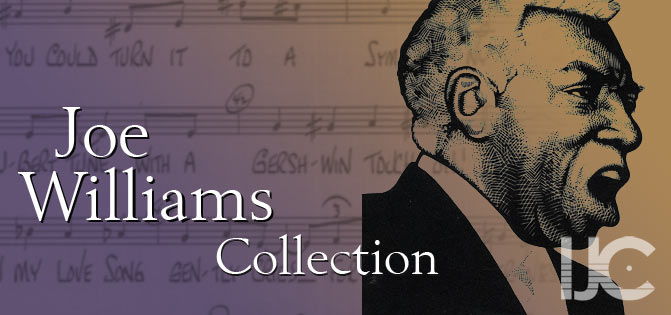Biography
Joseph Goreed, later to be known as Joe Williams, was born in Cordele, Georgia on December 12, 1918. His parents separated soon after he was born and, subsequently, he was raised by his mother and grandparents in Chicago.
In his early teen years, Williams formed a gospel quartet called “The Jubilee Boys.” By his mid-teens, Williams was performing for more formal events with local bands and making extra money. Due to his success, his family allowed him to drop out of school at the age of sixteen so that he could pursue his passion and skill in music. He chose the stage name Joe Williams, which marked a turning point in his career.
Williams’ professional singing career took off in 1937. By 1938, Williams was invited to sing for musician Jimmie Noone and his band. Within a year, Wiliams was touring the Midwest with saxophonist Les Hite, who accompanied the likes of Louis Armstrong and Fats Waller.
In 1942, Joe Williams was hired by Lionel Hampton to fill in for his regular vocalist. Joe sang for the Hampton orchestra’s home performances in Boston and for their cross-country tours. Even though his work with Lionel Hampton was brief, he became well known and was in great demand, particularly back in Chicago. In 1954, at the age of 35, he got his big break when he was hired as the male vocalist for the Count Basie Orchestra. He worked with them from 1954 through 1961 and gained tremendous exposure to blues.
In the 1960s Joe worked mostly as a solo artist. He would often accompany other jazz artists such as Harry Edison, Clark Terry, George Shearing and Cannonball Adderley. In 1971, Joe Williams and pianist George Shearing recorded The Heart and Soul of Joe Williams.
In 1983 Joe Williams was given a star on the Hollywood Walk of Fame, and in 1985 he received a Grammy Award for Best of Jazz Vocalist for the album I Just Want to Sing. In 1991 Joe was honored with a gala tribute for his contributions to music, and the following year he won his second Grammy Award for the song “Ballad and Blues Master” on his album I Just Want to Sing.
Joe Williams continued to contribute to music. Just two years before his death he sang a duet with Nancy Wilson at the San Francisco Jazz Festival. He was 80 years old when he died on March 29th, 1999 in Las Vegas, Nevada. He is buried at Palm Valley Memorial Park in Las Vegas, Nevada.

